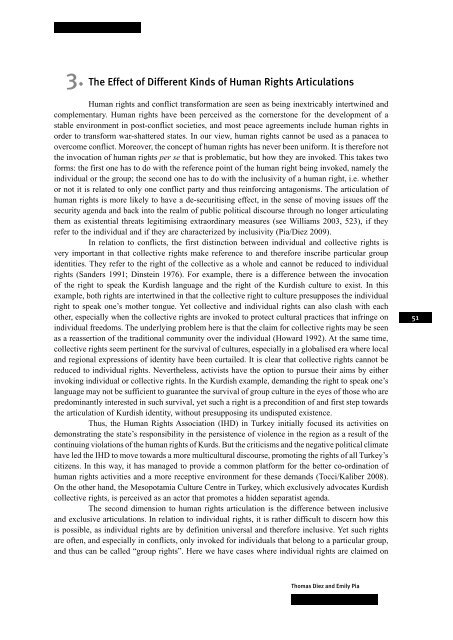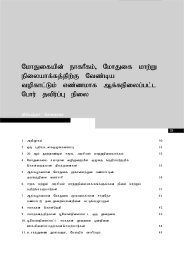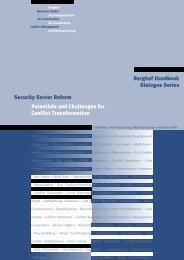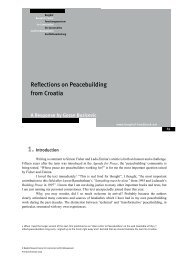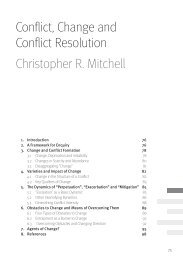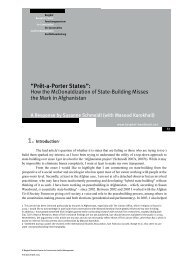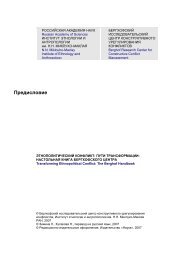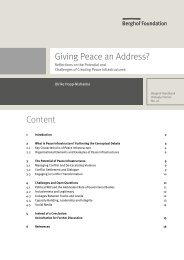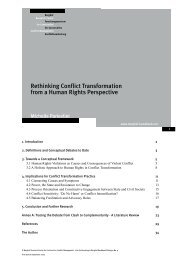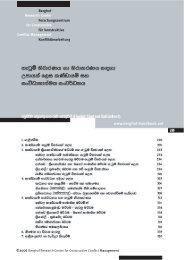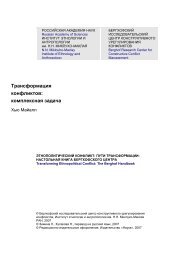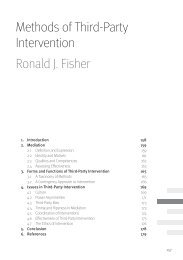Human rights and conflict transformation: The challenges of just peace
Human rights and conflict transformation: The challenges of just peace
Human rights and conflict transformation: The challenges of just peace
Create successful ePaper yourself
Turn your PDF publications into a flip-book with our unique Google optimized e-Paper software.
3. <strong>The</strong> Effect <strong>of</strong> Different Kinds <strong>of</strong> <strong>Human</strong> Rights Articulations<br />
<strong>Human</strong> <strong>rights</strong> <strong>and</strong> <strong>conflict</strong> <strong>transformation</strong> are seen as being inextricably intertwined <strong>and</strong><br />
complementary. <strong>Human</strong> <strong>rights</strong> have been perceived as the cornerstone for the development <strong>of</strong> a<br />
stable environment in post-<strong>conflict</strong> societies, <strong>and</strong> most <strong>peace</strong> agreements include human <strong>rights</strong> in<br />
order to transform war-shattered states. In our view, human <strong>rights</strong> cannot be used as a panacea to<br />
overcome <strong>conflict</strong>. Moreover, the concept <strong>of</strong> human <strong>rights</strong> has never been uniform. It is therefore not<br />
the invocation <strong>of</strong> human <strong>rights</strong> per se that is problematic, but how they are invoked. This takes two<br />
forms: the first one has to do with the reference point <strong>of</strong> the human right being invoked, namely the<br />
individual or the group; the second one has to do with the inclusivity <strong>of</strong> a human right, i.e. whether<br />
or not it is related to only one <strong>conflict</strong> party <strong>and</strong> thus reinforcing antagonisms. <strong>The</strong> articulation <strong>of</strong><br />
human <strong>rights</strong> is more likely to have a de-securitising effect, in the sense <strong>of</strong> moving issues <strong>of</strong>f the<br />
security agenda <strong>and</strong> back into the realm <strong>of</strong> public political discourse through no longer articulating<br />
them as existential threats legitimising extraordinary measures (see Williams 2003, 523), if they<br />
refer to the individual <strong>and</strong> if they are characterized by inclusivity (Pia/Diez 2009).<br />
In relation to <strong>conflict</strong>s, the first distinction between individual <strong>and</strong> collective <strong>rights</strong> is<br />
very important in that collective <strong>rights</strong> make reference to <strong>and</strong> therefore inscribe particular group<br />
identities. <strong>The</strong>y refer to the right <strong>of</strong> the collective as a whole <strong>and</strong> cannot be reduced to individual<br />
<strong>rights</strong> (S<strong>and</strong>ers 1991; Dinstein 1976). For example, there is a difference between the invocation<br />
<strong>of</strong> the right to speak the Kurdish language <strong>and</strong> the right <strong>of</strong> the Kurdish culture to exist. In this<br />
example, both <strong>rights</strong> are intertwined in that the collective right to culture presupposes the individual<br />
right to speak one’s mother tongue. Yet collective <strong>and</strong> individual <strong>rights</strong> can also clash with each<br />
other, especially when the collective <strong>rights</strong> are invoked to protect cultural practices that infringe on<br />
individual freedoms. <strong>The</strong> underlying problem here is that the claim for collective <strong>rights</strong> may be seen<br />
as a reassertion <strong>of</strong> the traditional community over the individual (Howard 1992). At the same time,<br />
collective <strong>rights</strong> seem pertinent for the survival <strong>of</strong> cultures, especially in a globalised era where local<br />
<strong>and</strong> regional expressions <strong>of</strong> identity have been curtailed. It is clear that collective <strong>rights</strong> cannot be<br />
reduced to individual <strong>rights</strong>. Nevertheless, activists have the option to pursue their aims by either<br />
invoking individual or collective <strong>rights</strong>. In the Kurdish example, dem<strong>and</strong>ing the right to speak one’s<br />
language may not be sufficient to guarantee the survival <strong>of</strong> group culture in the eyes <strong>of</strong> those who are<br />
predominantly interested in such survival, yet such a right is a precondition <strong>of</strong> <strong>and</strong> first step towards<br />
the articulation <strong>of</strong> Kurdish identity, without presupposing its undisputed existence.<br />
Thus, the <strong>Human</strong> Rights Association (IHD) in Turkey initially focused its activities on<br />
demonstrating the state’s responsibility in the persistence <strong>of</strong> violence in the region as a result <strong>of</strong> the<br />
continuing violations <strong>of</strong> the human <strong>rights</strong> <strong>of</strong> Kurds. But the criticisms <strong>and</strong> the negative political climate<br />
have led the IHD to move towards a more multicultural discourse, promoting the <strong>rights</strong> <strong>of</strong> all Turkey’s<br />
citizens. In this way, it has managed to provide a common platform for the better co-ordination <strong>of</strong><br />
human <strong>rights</strong> activities <strong>and</strong> a more receptive environment for these dem<strong>and</strong>s (Tocci/Kaliber 2008).<br />
On the other h<strong>and</strong>, the Mesopotamia Culture Centre in Turkey, which exclusively advocates Kurdish<br />
collective <strong>rights</strong>, is perceived as an actor that promotes a hidden separatist agenda.<br />
<strong>The</strong> second dimension to human <strong>rights</strong> articulation is the difference between inclusive<br />
<strong>and</strong> exclusive articulations. In relation to individual <strong>rights</strong>, it is rather difficult to discern how this<br />
is possible, as individual <strong>rights</strong> are by definition universal <strong>and</strong> therefore inclusive. Yet such <strong>rights</strong><br />
are <strong>of</strong>ten, <strong>and</strong> especially in <strong>conflict</strong>s, only invoked for individuals that belong to a particular group,<br />
<strong>and</strong> thus can be called “group <strong>rights</strong>”. Here we have cases where individual <strong>rights</strong> are claimed on<br />
Thomas Diez <strong>and</strong> Emily Pia<br />
51


